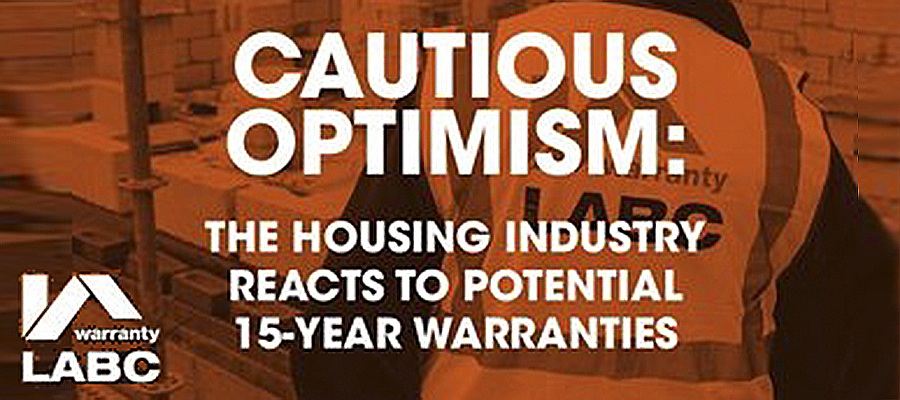Mandatory 15 year warranties on new homes supported with caution
An LABC Warranty survey has found that while the majority of those in the housing industry are unaware of the potential for minimum 15-year structural warranties to be introduced by law, they are optimistic about the effects of that change.
The Building Safety Act, introduced in April 2022, brings generational change to the UK's construction industry. The Act introduces new regulations, enforcement mechanisms regulatory bodies, and enhanced powers for these regulators.
Significantly, it also includes provisions that will make structural warranties legally mandatory for the first time.
The survey, which drew responses from housebuilders and developers, designers, building control professionals, consultants, contractors, self-build, social housing provider, and homeowners focused on two aspects of the proposed legislation:
Minimum 15-year warranties. The legislation, if triggered by secondary regulations, would establish a new standard of 15-year minimum coverage for structural warranties. Currently, most warranties span 10 years, with certain exceptions.
All new-home coverage. The new legislation, if activated, would also make it mandatory for all new-build homes to be covered by a structural warranty. Presently, no statutory requirement mandates warranty coverage for new build homes.
LABC Warranty's survey set out to discover the awareness level for the above legislative changes, and the level of support these changes have among existing structural warranty customers and readers of their technical content.
The survey shows that:
- 64% of respondents were unaware of the proposal to extend the standard 10/12-year warranty term to 15 years.
- 53% were unaware of a proposal to make warranty cover a legal requirement for all new homes.
Despite this:
- 60% of respondents are in favour of extending warranties from 10/12 years to 15 years.
- 58% believe mandating warranties would lead to better standards of safety, or improved customer satisfaction.
- Overall, 40% believed there would be a positive outcome if all warranty-related secondary legislation came into force, 23% believed it would lead to a negative outcome, and 37% believed it would lead to a mixed result.
Only 5% of respondents said they had prepared for the secondary legislation to be enacted.
Reasons in support of longer warranty periods included improved standards (46%), better protection for homeowners (41%) and alignment with the Defective Premises Act liability period (10%). Lack of need (56%) and increased cost (37%) were the main reasons for those against.
Building control practitioners were most in support of the extended term (92%) while housebuilders/developers were most against (67%).
LABC Warranty commented: "Even respondents who offered a broadly positive outlook had reservations about potential negative effects of the legislative changes discussed. Given this and the strength of feeling shown through comments, LABC Warranty would describe the response as a very cautious optimism while we await more details on any upcoming secondary legislation."
This article appears on the CIAT news and blogsite as "Industry 'cautiously supports' mandatory 15-year warranties on new homes" dated September 12, 2023.
--CIAT
[edit] Related articles on Designing Buildings
- Agency.
- Bonds.
- Bonds v guarantees.
- Breach of contract.
- Building Safety Act.
- Building safety bill.
- CIAT raises concerns about Building Safety Bill.
- CIOB responds to Newsnight report - Trapped: the UK's building safety crisis.
- CIOB reviews the Building Safety Bill.
- Collateral warranties.
- Defects.
- Definition of collateral warranty.
- Difference between collateral warranties and third party rights.
- Duty.
- Fire safety bill.
- Fit for purpose.
- Golden thread.
- Grenfell Tower fire.
- Grenfell Tower Inquiry.
- Guarantees.
- Hackitt Review.
- Insurance.
- Miller Act.
- Performance bond.
- Practical considerations of collateral warranties.
- Professional consultant's certificate.
- Reasonable skill and care.
- The Building Safety Bill and product testing.
- The Building Safety Bill - A Quality Response.
- The Building Safety Bill, regulations and competence.
- The golden thread and BS 8644-1
- Warranty.
Featured articles and news
Infrastructure that connect the physical and digital domains.
Harnessing robotics and AI in challenging environments
The key to nuclear decommissioning and fusion engineering.
BSRIA announces Lisa Ashworth as new CEO
Tasked with furthering BSRIA’s impressive growth ambitions.
Public buildings get half a million energy efficiency boost
£557 million to switch to cleaner heating and save on energy.
CIOB launches pre-election manifesto
Outlining potential future policies for the next government.
Grenfell Tower Inquiry announcement
Phase 2 hearings come to a close and the final report due in September.
Progress from Parts L, F and O: A whitepaper, one year on.
A replicated study to understand the opinion of practitioners.
ECA announces new president 2024
Electrical engineer and business leader Stuart Smith.
A distinct type of countryside that should be celebrated.
Should Part O be extended to existing buildings?
EAC brands heatwave adaptation a missed opportunity.
Definition of Statutory in workplace and facilities management
Established by IWFM, BESA, CIBSE and BSRIA.
Tackling the transition from traditional heating systems
59% lack the necessary information and confidence to switch.
The general election and the construction industry
As PM, Rishi Sunak announces July 4 date for an election.
Eco apprenticeships continue help grow green workforce
A year after being recognised at the King's coronation.
Permitted development rights for agricultural buildings
The changes coming into effect as of May 21, 2024.























